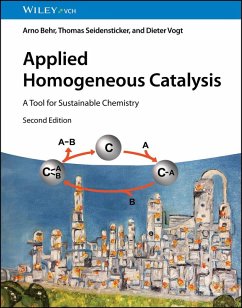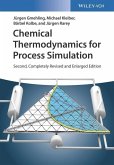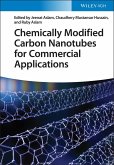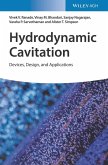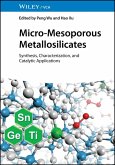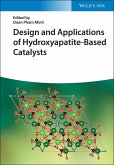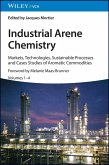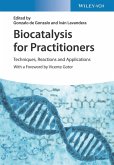One-stop reference on homogeneous catalysis, from general concepts through detailed examples and industrial applications
Accessible and richly illustrated, Applied Homogeneous Catalysis provides a concise overview of the broad field of homogeneous transition metal catalysis and its applications in the chemical industry. This newly revised and updated second edition puts special emphasis on green chemistry, sustainable resources, and processes.
The book is divided into five parts. Part I presents the basics of transition metal catalysis. Part II focuses on process engineering aspects. Part III provides details of the most important catalytic reactions. Part IV describes catalytic conversions closely related to classical homogeneous transition metal catalysis, such as nano-, electro-, photo- and organocatalysis. Part V covers new feedstocks and other topics, concluding with an outlook on future challenges of homogeneous catalysis.
The book contains numerous mechanistic details, technical information, and illustrative examples. The chapters are enlivened by various excursions that relate the content to everyday life or introduce important personalities. Didactically, the book is completed with learning objectives and take-home messages for each chapter, as well as more than 400 questions and answers for self-testing.
Written by a team of internationally renowned experts in the field, with a wealth of experience in industry and teaching, Applied Homogeneous Catalysis includes information on:
Providing expansive coverage of the subject, Applied Homogeneous Catalysis is an essential guide for researchers and professionals in the pharmaceutical, polymer, and fine and bulk chemicals industries working on catalysis or entering the field, as well as for Master's and PhD students in organic chemistry, chemical engineering, and related fields.
Accessible and richly illustrated, Applied Homogeneous Catalysis provides a concise overview of the broad field of homogeneous transition metal catalysis and its applications in the chemical industry. This newly revised and updated second edition puts special emphasis on green chemistry, sustainable resources, and processes.
The book is divided into five parts. Part I presents the basics of transition metal catalysis. Part II focuses on process engineering aspects. Part III provides details of the most important catalytic reactions. Part IV describes catalytic conversions closely related to classical homogeneous transition metal catalysis, such as nano-, electro-, photo- and organocatalysis. Part V covers new feedstocks and other topics, concluding with an outlook on future challenges of homogeneous catalysis.
The book contains numerous mechanistic details, technical information, and illustrative examples. The chapters are enlivened by various excursions that relate the content to everyday life or introduce important personalities. Didactically, the book is completed with learning objectives and take-home messages for each chapter, as well as more than 400 questions and answers for self-testing.
Written by a team of internationally renowned experts in the field, with a wealth of experience in industry and teaching, Applied Homogeneous Catalysis includes information on:
- Economic importance of industrial homogeneously-catalyzed reactions and basics of organometallic chemistry, including types of bonds, elemental steps, and mechanisms
- Common approaches for separating the homogeneous catalyst from the products after the reaction and using combinatorial chemistry and high throughput screening to achieve optimal results
- Activating "inactive" molecules such as carbon dioxide and nitrogen, and harnessing homogeneous catalysis for feedstock diversification by recycling polymers or using renewables.
Providing expansive coverage of the subject, Applied Homogeneous Catalysis is an essential guide for researchers and professionals in the pharmaceutical, polymer, and fine and bulk chemicals industries working on catalysis or entering the field, as well as for Master's and PhD students in organic chemistry, chemical engineering, and related fields.
Dieser Download kann aus rechtlichen Gründen nur mit Rechnungsadresse in D ausgeliefert werden.

